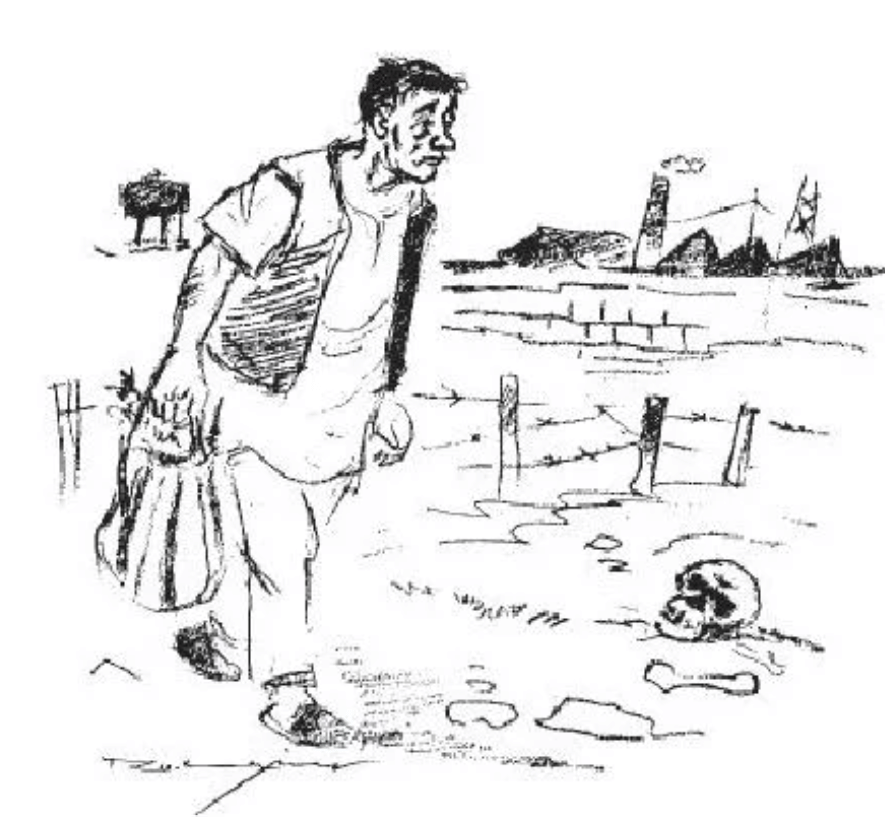Class 9 Moments Supplementary Reader Chapter 3 Question Answers - Iswaran the Storyteller
Q1: What was Mahendra’s profession, and what were his responsibilities at work?
Ans: Mahendra worked as a junior supervisor in a company that specialized in providing supervisors for various construction projects. His main responsibility was to oversee and monitor the activities happening at different construction sites, which included factories, bridges, and dams. He was required to frequently move from one worksite to another based on instructions from his head office, ensuring that everything was running smoothly and according to the company’s standards.

Q2: Describe Iswaran's role in Mahendra’s daily life and work routine.
Ans: Iswaran played a vital role in Mahendra’s life, not only as his cook but also as his companion. He accompanied Mahendra to every worksite, taking care of his daily needs, which included cooking meals, washing clothes, and maintaining the household. Apart from his domestic duties, Iswaran entertained Mahendra by narrating captivating stories filled with drama, suspense, and unexpected twists. His ability to make even the most mundane tasks seem interesting made him an indispensable part of Mahendra's life.
Q3: How did Iswaran narrate stories, and what impact did his storytelling have on Mahendra?
Ans: Iswaran had a unique way of telling stories, often building up suspense and concluding with surprise endings. His style was heavily influenced by Tamil authors, and he would bring dramatic expressions, sound effects, and theatrical pauses into his narratives. Mahendra was deeply captivated by Iswaran’s storytelling. He would listen to these stories with complete fascination, without questioning their authenticity. Iswaran’s vivid imagination and skillful narration made a significant impact on Mahendra, as he eagerly anticipated each new tale.
Q4: What incident caused Mahendra to decide to leave the haunted place?
Ans: One night, Mahendra was woken by an eerie moaning sound. When he looked out of his window, he saw a dark, cloudy figure clutching a bundle, which resembled the ghost that Iswaran had described in one of his stories. This terrifying sight deeply disturbed Mahendra, and he was convinced that the place was haunted. The fear and anxiety from this experience made Mahendra decide to resign from his job and leave the site immediately.
Q5: How did Mahendra react when Iswaran revealed his own sighting of the female ghost?
Ans: When Iswaran casually mentioned that he had heard the same moaning sound from Mahendra's room and implied that Mahendra had seen the ghost, Mahendra was overcome with fear. The realization that Iswaran's ghost story might be true chilled him to the core. The combination of the terrifying sighting and Iswaran’s confirmation led Mahendra to hastily submit his resignation and make plans to leave the place, as he could no longer bear to stay in such a haunted location.
Q6: Describe Iswaran’s ability to produce vegetables and other ingredients in remote locations.
Ans: Iswaran possessed an extraordinary skill of producing fresh vegetables and other cooking ingredients, even in remote locations where there were no shops or markets for miles around. This "magical" ability amazed Mahendra, as Iswaran could whip up delicious meals within a short time after arriving at any new worksite, seemingly out of thin air. His resourcefulness added to the mystique of his character.

Q7: What chaos did the elephant cause before Iswaran was able to control it?
Ans: The elephant, a wild tusker, had escaped from a timber yard and wandered into a nearby town, causing panic and chaos. It roamed the streets, scaring people and destroying property. Eventually, the elephant entered the grounds of a school, where children were playing. In its rage, the tusker uprooted the football goalpost, tore down the volleyball net, and smashed a large water drum. The frightened schoolchildren rushed into their classrooms and bolted the doors, while the townspeople watched helplessly, unsure how to stop the rampaging elephant.
Q8: Do you believe the ghost that Mahendra saw was just a trick played by Iswaran? Provide reasons for your answer.
Ans: It is highly possible that the ghost Mahendra saw was part of an elaborate trick played by Iswaran. First, Iswaran had set the stage by telling Mahendra that the site they lived on was a former burial ground. Then, he narrated a story about a female ghost to fuel Mahendra’s imagination. On the night in question, Mahendra saw a figure resembling the ghost Iswaran had described. The following morning, Iswaran confirmed that Mahendra had indeed seen the ghost, further cementing the idea in his mind. These events suggest that Iswaran may have orchestrated the entire scenario to play a trick on his master.
Q9: What was Iswaran’s usual routine after Mahendra left for work?
Ans: After Mahendra left for work each day, Iswaran would start his routine by tidying up the living quarters and washing Mahendra's clothes. He would then take a bath and prepare his lunch. After finishing his meal, Iswaran would often indulge in reading for a while before taking a nap. His ability to vividly describe what he read added flair to his otherwise simple routine, making it seem more engaging and creative.
Q10: Although Mahendra believed that ghosts were a figment of the imagination, what happened to him on a full moon night?
Ans: Mahendra was a firm skeptic and often dismissed the idea of ghosts or spirits as nothing more than figments of the imagination. However, one day Iswaran told him about a female ghost carrying a foetus in her arms, which had supposedly been sighted in the area. On a full moon night, Mahendra woke up from his sleep to the sound of moaning. When he looked outside his window, he was shocked and terrified to see a figure resembling the ghost that Iswaran had described. This experience caused him to break into a cold sweat and question his previous disbelief.
Q11: Describe Mahendra’s character in about 30-40 words.
Ans: Mahendra was a simple and hardworking man who led a modest life. He worked as a junior supervisor in a construction firm, frequently relocating to different sites as per his job's demands. He was sincere, dedicated to his work, and kind-hearted toward Iswaran, his loyal companion and cook.
Q12: What destruction did the elephant cause in the schoolyard?
Ans: In its rampage, the elephant broke through the brick wall of the schoolyard. It pulled out the football goalpost, tore down the volleyball net, and trampled the water drum placed in the yard. The tusker also uprooted several shrubs, leaving the schoolyard in ruins.
Q13: Why did Iswaran request permission to cook a special dinner?
Ans: Iswaran asked Mahendra for permission to prepare a special dinner because it was an auspicious day when, according to tradition, people cooked special dishes to offer to the spirits of their ancestors. However, Iswaran had another motive: he was setting the stage for one of his ghost stories by creating a spooky atmosphere.
Q14: What did Iswaran tell Mahendra about the factory area where they were staying?
Ans: Iswaran informed Mahendra that the area around the factory where they were staying had once been a burial ground. He claimed to have found bones and human skulls scattered along the paths and even mentioned that he had seen a female ghost in the area. This story served to add a sense of eeriness to their surroundings.
Q15: Can you suggest an alternate ending for the story?
Ans: An alternative ending could be that Mahendra realizes Iswaran played a trick on him with the ghost story. Instead of resigning from his job, Mahendra confronts Iswaran and uncovers the truth behind the supposed haunting. Iswaran, feeling guilty, apologizes for his actions and promises to stop telling such stories in the future. They continue to live together peacefully, with Iswaran focusing more on his culinary talents rather than storytelling.
|
261 videos|1318 docs|124 tests
|
FAQs on Class 9 Moments Supplementary Reader Chapter 3 Question Answers - Iswaran the Storyteller
| 1. What is the main theme of "Iswaran the Storyteller"? |  |
| 2. Who is the protagonist of the story "Iswaran the Storyteller"? |  |
| 3. How does Iswaran's storytelling affect the narrator in the story? |  |
| 4. What role does Iswaran play in the narrator's life in "Iswaran the Storyteller"? |  |
| 5. How does the story "Iswaran the Storyteller" explore the power of imagination and storytelling? |  |






















